Ruby
Rescued and rehabbed pup Junebug goes home to the wild
Sep/18/14 06:10 PM
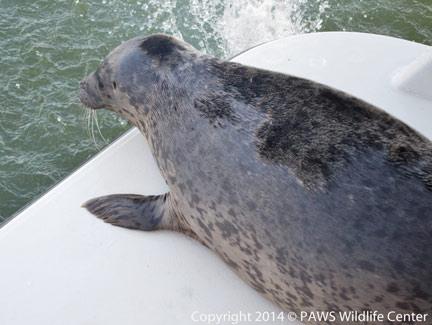
The abandoned and estimated only 5-8 day old pup was rescued by Seal Sitters MMSN from West Seattle’s Duwamish Head on July 1st. He weighed only 8.6 kg upon intake at the Lynnwood urgent care facility. Junebug was a whopping 31.1 kg on release day (see photo courtesy of PAWS). The tubby pup was released at a known harbor seal haulout near Everett with the help of the Coast Guard.
Rehab for newborn seal pups - and weaned pups - is a lengthy process, as indicated by Junebug’s two-month stay at PAWS. There is no evidence that a fattened up rehab pup has greater odds of survival than wild-weaned ones. All pups face 50% mortality their first year and some would argue that a week-old rehabbed pup who has not been taught to forage in the wild faces even worse odds.
In late January of 2013, Seal Sitters’ first responder noticed a red tag on a pup resting near Salty’s on Harbor Avenue (rehab tags changed from red to orange in 2014). A check in the stranding network database revealed that the pup, whom volunteers nicknamed Ruby, had been rehabbed at PAWS and released in October of 2012 at a harbor seal haulout south of Tacoma. Ruby had made the long trek to Seattle and Seal Sitters volunteers watched over her almost every day - keeping her safe from disturbance - for the next few months at West Seattle’s Jack Block Park. She befriended another weaner pup nicknamed Buddy at the park, but they finally travelled on at the end of April.
The Marine Mammal Stranding Network would like to receive reports which include i.d. numbers of tagged seals, dead or alive. With respect to harbor seal pups, these reports are extremely helpful in determining the survival rate of rehabilitated animals.
Thanks so much to PAWS Wildlife Center and their awesome staff for giving Junebug a second chance at life!
Seal Sitters reflects on another record-breaking year
Dec/31/13 05:09 AM
2013 was a roller coaster year for Seal Sitters’ volunteers. Early in the year, we received a grant for an educational outreach project, Year of the Seal, which culminated with the installation of a bronze sculpture at Alki Beach in September. Additionally, it proved to be another record-breaking season for responses to marine mammals on the beaches of West Seattle. Volunteers donated thousands of hours to the very time-intensive endeavor of protecting seal pups on urban beaches while also navigating the sometimes murky waters of a public art project.
THE STATS
2013 was a record breaking season for seal pups on shore in West Seattle. Seal Sitters’ hotline operators fielded many hundreds of calls from all over the Puget Sound region (check back for updated stats on hotline calls). Harbor seal pupping season in South Puget Sound is late June - September, but our busiest months are September and October as pups leave the relative safety of rookeries and strike out on their own.
On July 19th we responded to a report of our first newborn pup of the season, a stillbirth on Harbor Island. Since late July to date in West Seattle, volunteers have logged over 163 responses to marine mammals on the beach, the large majority of which were seal pups, but a few also to harbor porpoise and sea lions. In the past 6 months, we have protected 66 positively identified pups ranging in age from a few days to a few months old (an increase from 51 ID’d pups in 2011’s record year) - a number of these pups hauled out repeatedly for days in a row. With a higher number of seal pups, we also responded to more dead pups, 24 (10 of whom were pups we had protected). Most disturbing was the disproportionate number of emaciated pups for the second year in a row.
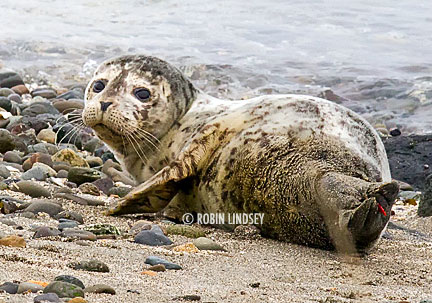 A highlight of pupping season was the story of Ruby, a newborn seal pup who had been harassed by people and dogs on a Steilacoom beach and subsequently abandoned by her mom. Only a week or so old, the pup was transported to PAWS in Lynnwood for rehabilitation. Following a successful and lengthy rehab, she was released back to the wild at a harbor seal haul-out near Everett. Ruby appeared one day on shore in West Seattle with her distinctive red rehab tag attached to her flipper (photo right). Over the course of several months, volunteers monitored Ruby’s health as she foraged and rested at Jack Block Park, where she found a true friend in seal pup Buddy. Their friendship was heartwarming and thrilling for both volunteers and the public who observed them daily. Read about Ruby and Buddy here.
A highlight of pupping season was the story of Ruby, a newborn seal pup who had been harassed by people and dogs on a Steilacoom beach and subsequently abandoned by her mom. Only a week or so old, the pup was transported to PAWS in Lynnwood for rehabilitation. Following a successful and lengthy rehab, she was released back to the wild at a harbor seal haul-out near Everett. Ruby appeared one day on shore in West Seattle with her distinctive red rehab tag attached to her flipper (photo right). Over the course of several months, volunteers monitored Ruby’s health as she foraged and rested at Jack Block Park, where she found a true friend in seal pup Buddy. Their friendship was heartwarming and thrilling for both volunteers and the public who observed them daily. Read about Ruby and Buddy here.
Why are there so many seal pups in West Seattle? That is, of course, difficult to answer. Perhaps our proximity to both Puget Sound and Elliott Bay waters with a varied food source. Certainly, it could it be, too, that we have made a refuge on shore for struggling pups so that they can get the rest they need. Our community has rallied around the protection of these small and vulnerable marine mammals. If a seal pup can feel safe on the beach and there is a food source nearby, that pup will continue to forage and return to the beach, gaining the strength necessary to survive that critical first year.
PROJECTS
Seal Sitters received a third City of Seattle Department of Neighborhoods in-kind grant award this year. As a result, a high-visibility educational project was completed:
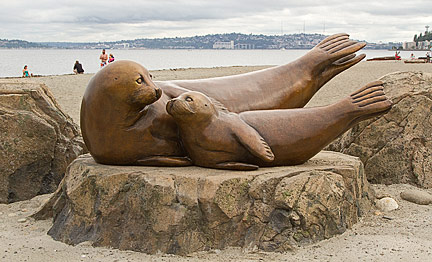 • Year of the Seal. This educational outreach project’s goal was to educate the public about the dangers of marine pollution and its devastating impact on marine life.
• Year of the Seal. This educational outreach project’s goal was to educate the public about the dangers of marine pollution and its devastating impact on marine life.
• Sentinels of the Sound. A bronze sculpture by acclaimed Northwest artist Georgia Gerber was installed at Alki Beach, along with an informational plaque. View videos here.
• Harbor Seal Day. Over 300 people attended a sculpture dedication ceremony and educational outreach event held at the Alki Bathhouse on September 8th. Proclaimed Harbor Seal Day by Seattle Mayor Mike McGinn and Washington Governor Jay Inslee, nine environmental groups had booths and educated the public about marine mammals, marine debris and pollution.
COMMUNITY OUTREACH
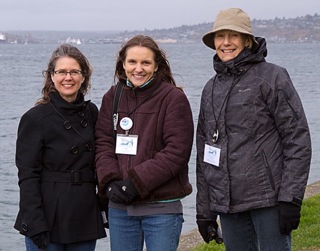 Passionate volunteers like Christine, Nina and Connie donated thousands of hours of educational outreach on the beaches and at events, working the hotline and scheduling volunteers. Thousands of Share the Shore pocket brochures were distributed.
Passionate volunteers like Christine, Nina and Connie donated thousands of hours of educational outreach on the beaches and at events, working the hotline and scheduling volunteers. Thousands of Share the Shore pocket brochures were distributed.
• We participated in a number of street fairs and events, educating many hundreds of people about marine mammals, marine pollution and NOAA’s NW stranding network.
• Seal Sitters co-sponsored a beach cleanup with the Alki Community Council and Seattle Parks and Recreation, receiving media coverage and raising awareness about marine debris.
• Volunteers made presentations at schools; area children took the pledge to protect the marine environment and received Seal Ambassador certificates. If you know a child who would like to become an ambassador, contact us.
• 129 new volunteers were trained in 2013.
MEDIA
• KCTS-9 documentary filmmaker Katie Campbell did a feature segment on Seal Sitters which continues to air regularly on the PBS station. The segment centered on last year’s survival struggles of seal pups on our West Seattle shores, the impact of toxins on marine mammals and funding cuts for research.
• Print, tv and internet media kept Seal Sitters’ work in the news.
• Seal Sitters young volunteers were featured in a Scholastic Magazine cover story. Our kids rock!
YOU CAN HELP
Thanks to all our amazing volunteers and to the community for making this such a successful year. If you’d like to help support Seal Sitters’ work with a donation, please click here. We receive no funding for our on-going expenses and even the smallest amount helps defray the cost of our dedicated hotline, websites, gas and stranding and educational supplies. We wish everyone a peaceful and happy new year!
THE STATS
2013 was a record breaking season for seal pups on shore in West Seattle. Seal Sitters’ hotline operators fielded many hundreds of calls from all over the Puget Sound region (check back for updated stats on hotline calls). Harbor seal pupping season in South Puget Sound is late June - September, but our busiest months are September and October as pups leave the relative safety of rookeries and strike out on their own.
On July 19th we responded to a report of our first newborn pup of the season, a stillbirth on Harbor Island. Since late July to date in West Seattle, volunteers have logged over 163 responses to marine mammals on the beach, the large majority of which were seal pups, but a few also to harbor porpoise and sea lions. In the past 6 months, we have protected 66 positively identified pups ranging in age from a few days to a few months old (an increase from 51 ID’d pups in 2011’s record year) - a number of these pups hauled out repeatedly for days in a row. With a higher number of seal pups, we also responded to more dead pups, 24 (10 of whom were pups we had protected). Most disturbing was the disproportionate number of emaciated pups for the second year in a row.

Why are there so many seal pups in West Seattle? That is, of course, difficult to answer. Perhaps our proximity to both Puget Sound and Elliott Bay waters with a varied food source. Certainly, it could it be, too, that we have made a refuge on shore for struggling pups so that they can get the rest they need. Our community has rallied around the protection of these small and vulnerable marine mammals. If a seal pup can feel safe on the beach and there is a food source nearby, that pup will continue to forage and return to the beach, gaining the strength necessary to survive that critical first year.
PROJECTS
Seal Sitters received a third City of Seattle Department of Neighborhoods in-kind grant award this year. As a result, a high-visibility educational project was completed:

• Sentinels of the Sound. A bronze sculpture by acclaimed Northwest artist Georgia Gerber was installed at Alki Beach, along with an informational plaque. View videos here.
• Harbor Seal Day. Over 300 people attended a sculpture dedication ceremony and educational outreach event held at the Alki Bathhouse on September 8th. Proclaimed Harbor Seal Day by Seattle Mayor Mike McGinn and Washington Governor Jay Inslee, nine environmental groups had booths and educated the public about marine mammals, marine debris and pollution.
COMMUNITY OUTREACH

• We participated in a number of street fairs and events, educating many hundreds of people about marine mammals, marine pollution and NOAA’s NW stranding network.
• Seal Sitters co-sponsored a beach cleanup with the Alki Community Council and Seattle Parks and Recreation, receiving media coverage and raising awareness about marine debris.
• Volunteers made presentations at schools; area children took the pledge to protect the marine environment and received Seal Ambassador certificates. If you know a child who would like to become an ambassador, contact us.
• 129 new volunteers were trained in 2013.
MEDIA
• KCTS-9 documentary filmmaker Katie Campbell did a feature segment on Seal Sitters which continues to air regularly on the PBS station. The segment centered on last year’s survival struggles of seal pups on our West Seattle shores, the impact of toxins on marine mammals and funding cuts for research.
• Print, tv and internet media kept Seal Sitters’ work in the news.
• Seal Sitters young volunteers were featured in a Scholastic Magazine cover story. Our kids rock!
YOU CAN HELP
Thanks to all our amazing volunteers and to the community for making this such a successful year. If you’d like to help support Seal Sitters’ work with a donation, please click here. We receive no funding for our on-going expenses and even the smallest amount helps defray the cost of our dedicated hotline, websites, gas and stranding and educational supplies. We wish everyone a peaceful and happy new year!
Seal pals enjoy sunny day
Apr/14/13 09:29 PM
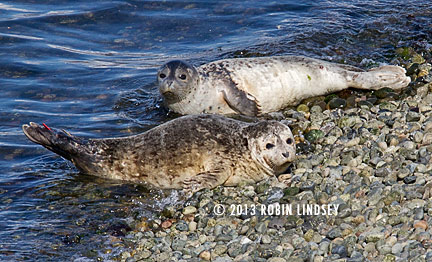
Rehab Ruby (in front, showing off her red flipper tag) has become somewhat of a celebrity, featured in this month’s issue of PAWS Magazine. She was taken to PAWS Wildlife Center at only 1 week old, abandoned on a beach in Steilacoom after being harassed by people. After her release back to a South Puget Sound harbor seal rookery in October, she made her way north several months later to the shores of Elliott Bay. She has found quite the friend in Buddy, who hangs out with her most every day at Jack Block. Seal Sitters volunteers have been monitoring both pups’ health over the past months. Read more about Ruby’s travels here.
Seal pup Ruby finds a much-needed friend
Mar/28/13 11:24 PM
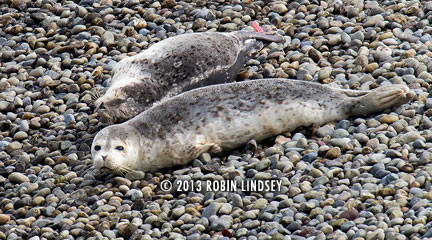
Ruby was taken from a Steilacoom beach to PAWS Wildlife Center when only a week old and had no contact with any other seals while in rehab for several months. Weak and dehydrated, she had been harassed by people on the beach and abandoned by her mother. She was released last October to a harbor seal haulout in that same area, but had not been sighted again until she appeared at a cove near Salty’s in late January.
Volunteers sighted Ruby numerous times over the next weeks on the Jack Block beaches, but never on the abandoned dock with the many other resting seals - she was always alone. That is, until Buddy befriended the 8-month-old pup. Ruby’s health had been taking a turn for the worse, with evidence of respiratory issues and volunteers were monitoring her health from the observation tower above the beach. However, Ruby seems to have rebounded and put on weight since they have been foraging and hauling out together. Buddy is usually on the alert as she sleeps, so she is able to get extended, stress-free rest. It has been a joy to watch this relationship develop as Ruby becomes more open to Buddy’s presence near her. Both volunteers and the public have had a rare opportunity to observe the heartwarming bonding of these two vulnerable weaners - and there truly is safety in numbers for seal pups.
Shamrock and other seal pups lucky to have caring public
Mar/20/13 08:51 AM
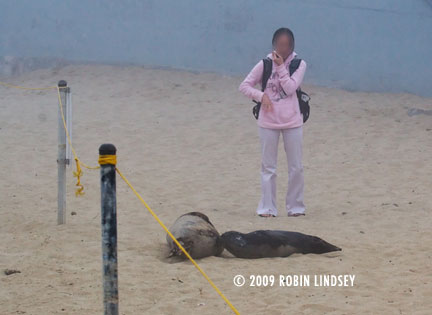
A small number of residents of this affluent San Diego neighborhood want the seals removed from the beach so it can become a public swimming beach - they regularly harass the seals. However, the majority of residents appreciate and want to preserve the rookery. Casa Beach is one of only four harbor seal rookeries left on the Southern California coast. There are many, many public beaches along the nearby coast for humans to enjoy, including one within walking distance of Casa Beach. Local wildlife advocates have been fighting for many frustrating years now to get local and federal governments to step up and protect the seals. Finally, it was agreed that a rope barrier would be established on the beach during pupping season, but that has not stopped the abuse.
Recently, a web cam was established on an old lifeguard tower to enable the public to view seals giving birth on the beach; harbor seal pupping season is in full swing in Southern California. The night vision camera recently caught two women beating and sitting on seals, many of them pregnant, and the incident has caused outrage. NOAA has not been yet been able to identify and prosecute the women.
Yesterday, the mayor of San Diego, Bob Filner, ordered the beach and sea wall closed to people at night. However, the public is still allowed down on the beach during the day, with harbor seals just a few feet away giving birth or nursing their young.
Seal Sitters has covered this story since our lead investigator visited the rookery in 2008, returning the following year as well to document moms and their pups. Read our complete coverage of this controversial situation on our website. And, please email Mayor Filner thanking him for closing the beach at night, but encouraging him to close Casa Beach (Children’s Pool) year-round to people and preserve this wildlife treasure. The public has an unparalled view from the sea wall and sidewalk above the beach.
Our West Seattle seal pups are so very lucky to have a stranding network (with a supportive NOAA Northwest office) and public committed to keeping them safe while on our shores. We know that undisturbed rest is critical to harbor seals’ survival and they will be protected under our communal watch.
UPDATE 3/21/13
For the latest news regarding this story, please visit our dedicated website page.
CNN has a feature story on the abuse at Casa Beach on their website today. Click on the link below:
(CNN) SEAL VIDEO BRINGS NATIONAL SPOTLIGHT ON ANIMAL ABUSE
St. Paddy's pinniped party in West Seattle
Mar/17/13 10:19 PM
St. Patrick’s Day festivities started early this morning for Seal Sitters’ responder Lynn who was doing a routine check of Jack Block Park beaches. Standing on the observation tower platform shortly after 8am, she noticed rehab pup Ruby, with her bright red flipper tag, haul out onto the inaccessible beach below her. Ruby was only about a week old when she had to be taken to PAWS after repeated harassment by beachcombers in Steilacoom. After a lengthy stay at PAWS to fatten up and learn how to catch fish on her own, she was released back to the wild last October at a harbor seal haulout south of Tacoma. Seal Sitters first sighted her in West Seattle in late January and she has since been a regular visitor along the shoreline of Jack Block. We are excited that she has remained on our beat.
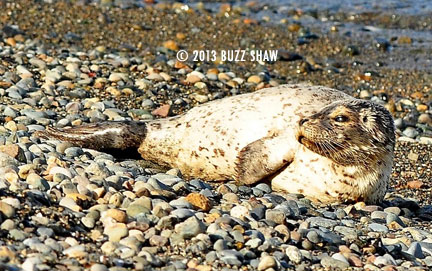 As Lynn was walking out of the Park, she noticed yet another pup on the public beach, notorious for off leash dogs. She immediately taped off the beach entrance and established a perimeter with sandwich boards and signs. Volunteers were lined up to keep a close eye on the pup, nicknamed Shamrock (shown at right). On this cold and windy day, brand new volunteers (including young volunteers Fionn and Owen) along with more experienced Seal Sitters protected Shamrock until she returned to Elliott Bay late in the day.
As Lynn was walking out of the Park, she noticed yet another pup on the public beach, notorious for off leash dogs. She immediately taped off the beach entrance and established a perimeter with sandwich boards and signs. Volunteers were lined up to keep a close eye on the pup, nicknamed Shamrock (shown at right). On this cold and windy day, brand new volunteers (including young volunteers Fionn and Owen) along with more experienced Seal Sitters protected Shamrock until she returned to Elliott Bay late in the day.
Thanks to the many volunteers who put in such long hours today. Ruby was still resting on the beach as darkness fell, along with a third pup who came ashore near her during the afternoon. It looks like Ruby has found a friend, who has been nicknamed Buddy. A very happy St. Paddy’s indeed!

Thanks to the many volunteers who put in such long hours today. Ruby was still resting on the beach as darkness fell, along with a third pup who came ashore near her during the afternoon. It looks like Ruby has found a friend, who has been nicknamed Buddy. A very happy St. Paddy’s indeed!
Seal pups still using West Seattle shoreline
Feb/24/13 02:04 PM
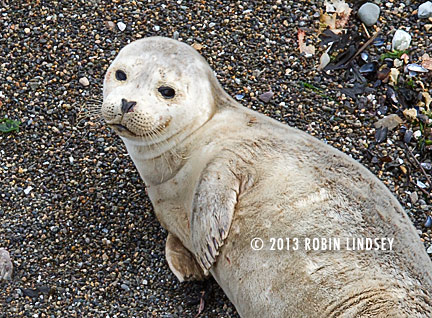
Cinnamon returned to Elliott Bay around 5pm in the evening. She was back on shore early this morning, but returned to the water about 7am - perhaps off to a breakfast buffet of 3-spined stickleback and squid.
PUPDATE:
We suspect Spencer, who spent 4 days resting along the length of Alki Avenue recently under the watchful eye of Seal Sitters volunteers, has been coming ashore at night to rest. Our early morning first responder has seen a pup return to the water between 6 and 6:30 several mornings and found seal tracks in the sand another morning at the same location. The responder has not been able to get an id photo, so we can’t confirm the pup is indeed Spencer.
Ruby, the rehabilitated pup, hasn’t been seen for about a week, but that doesn’t mean the pup with the bright red flipper tag isn’t still in our area. The last time we sighted her dozing at Jack Block, she had packed on some blubber which made us all very happy.
Spencer's haulout streak ends at four days
Feb/17/13 06:46 PM
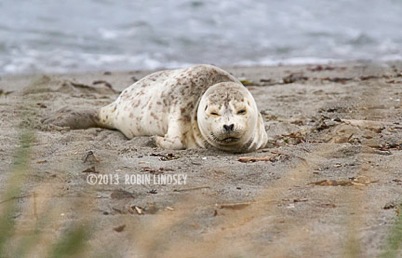
Among the people that gathered as he wriggled ashore was a woman who offered our responder a hand toting cones and stakes. We can’t thank her enough for her help. Once again, off leash dogs were an issue at Alki and we gave Spencer a generous boundary on the beach.
Volunteers watched over the pup in shifts and talked to many curious and delighted people, letting them peer through the spotting scope for an even closer look and distributing informational pamphlets. Bald eagles were abundant and acrobatic overhead, entertaining volunteers as the pup zonked out for a snooze. A river otter swam leisurely by. On the sidewalk, leashed dogs of every size and shape received pats and rubs while owners stopped to learn about Spencer.
The seal pup was still sleeping on the sand long after darkness fell, but had moved down nearer the water’s edge. He was gone when we checked at 10pm last night.
Spencer is most definitely looking too thin. We hope this extended rest and hospitality shown by West Seattle residents and visitors will give him a boost in energy to forage for food. We did not see him on shore all day today. However, there was a small, white pup on the offshore platform surrounded by cormorants. Perhaps it was Spencer sleeping at that infinitely safer location.
Ruby, the rehabilitated pup from south of Tacoma, is still using the Jack Block Park area. She was sighted napping on the protected beach the other morning. Ruby has put on weight since we first spotted her last month. Read about Ruby here.
Peaceful, easy feeling for West Seattle seals
Feb/06/13 05:41 AM
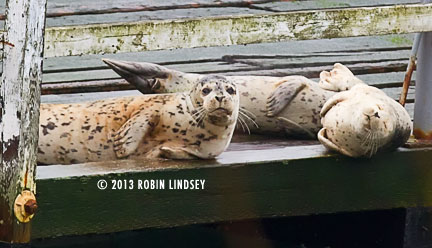
Rehab Ruby (see related posts) was on the open beach early Sunday morning and yet another pup was found resting there yesterday. Our responder immediately closed the beach to protect the pup. Due to beach erosion, Port maintenance workers moved the entrance to the public beach back closer to the parking lot. Now, however, when one enters the beach, it is not possible to see if a seal is resting there. Please be extra cautious when entering - or, even better, take the extra minute and scan the beach from behind the railing closer to the pier before entering. Since the Park is closed at night, it appears that pups are coming ashore there to sleep and sometimes are still resting when the Park reopens early the next morning.
Please be sure to call our hotline @ 206-905-7325 (SEAL) if you see a pup on the public-accessible beach.
No worries for seal pup Squiggles at boat ramp
Jan/30/13 07:25 PM
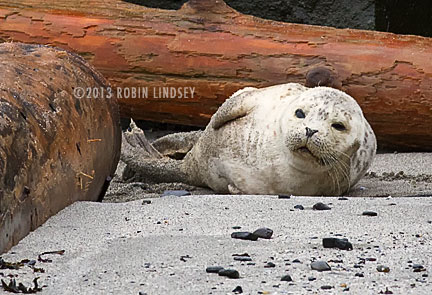
Squiggles barely stirred even as a large boat launched from the ramp opposite her and finally returned to Elliott Bay around 4pm. Seal pups seem to consider the ramp and parking lot as one endless easy access beach, not realizing the extreme dangers of the location with boats and trailers and car traffic.
Rehab Ruby was sighted around 3pm resting on the protected beach at Jack Block Park. Great news - it looks like Ruby has gained some weight since we first saw just over a week ago. We are thrilled that she has chosen West Seattle as her new home.
Resilient volunteers protect seal pups in the cold and damp
Jan/29/13 06:07 AM
Cold, wet weather can’t discourage Seal Sitters on a mission. On Saturday morning, die-hard volunteer Lynn was doing rounds, checking the beaches and docks at Jack Block Park to make sure that rehab pup Ruby and her new-found pinniped friends were safe and sound. She discovered a skitterish pup hauled out on the beach just below the entrance to the public pier. In blustery conditions, with help from fellow volunteer Theresa, a perimeter was established to provide enough space for the pup, nicknamed Scooter, to try to rest undisturbed.
Scooter snoozed throughout the cold, damp day. Shivering volunteers watched over him in shifts and Starbucks generously donated two carafes of coffee to help them thaw out. Thank you, Starbucks on Alki and to our volunteers for braving the elements! Scooter returned to Elliott Bay around 3 pm.
A short time later, Ruby with her red flipper tag was briefly sighted resting on the protected, inaccessible beach below the observatory tower.
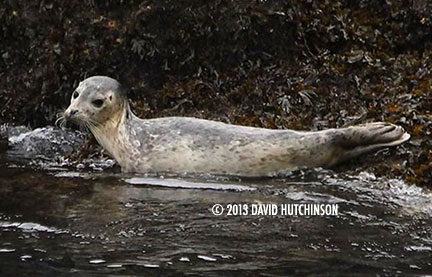 About 10:30 Monday morning, we received a report of a pup hauled out high on the rocks below the seawall along Harbor Avenue. The terribly thin pup had apparently come in at high tide quite early in the morning. Bright yellow tape was stretched between barricades, cones and stakes along the sidewalk above her.
About 10:30 Monday morning, we received a report of a pup hauled out high on the rocks below the seawall along Harbor Avenue. The terribly thin pup had apparently come in at high tide quite early in the morning. Bright yellow tape was stretched between barricades, cones and stakes along the sidewalk above her.
Nicknamed Misty on this soggy day, she napped for hours inside her safety zone, oblivious even to firetrucks zipping by with sirens blasting. Perhaps she was deep in dreams, catching some of the many gunnel the cormorants were feasting on in the cove. If so, we hope those dreams come true because Misty really needs to fatten up to help ward off parasites and respiratory infections. The good news is, we did not observe any coughing spells or significant discharge. She returned to Elliott Bay shortly before 3 as the returning tide swept over her perch. Flipper hugs to the volunteers who endured the rain and educated those who stopped by to ask questions and take a peek at Misty.
Scooter snoozed throughout the cold, damp day. Shivering volunteers watched over him in shifts and Starbucks generously donated two carafes of coffee to help them thaw out. Thank you, Starbucks on Alki and to our volunteers for braving the elements! Scooter returned to Elliott Bay around 3 pm.
A short time later, Ruby with her red flipper tag was briefly sighted resting on the protected, inaccessible beach below the observatory tower.

Nicknamed Misty on this soggy day, she napped for hours inside her safety zone, oblivious even to firetrucks zipping by with sirens blasting. Perhaps she was deep in dreams, catching some of the many gunnel the cormorants were feasting on in the cove. If so, we hope those dreams come true because Misty really needs to fatten up to help ward off parasites and respiratory infections. The good news is, we did not observe any coughing spells or significant discharge. She returned to Elliott Bay shortly before 3 as the returning tide swept over her perch. Flipper hugs to the volunteers who endured the rain and educated those who stopped by to ask questions and take a peek at Misty.
Ruby the rehabbed seal enjoys safer shores of West Seattle
Jan/26/13 06:01 AM
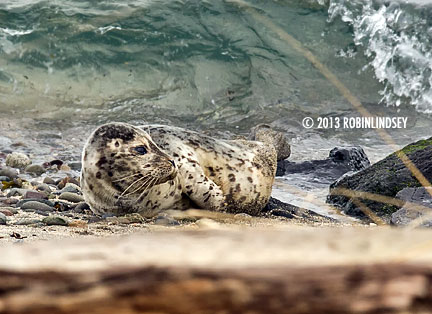
We have learned more about the human interference that landed her in PAWS rehab facility last July. According to WDFW Marine Mammal Investigations, over a period of several days, Ruby had been coming and going from the beach at a park near Steilacoom’s old Saltar Marina. There were reports of her being “poked with sticks” and people pouring water over her. Because she had been harassed by people and apparently abandoned, she was taken to PAWS.
Ruby was given a new lease on life by the wildlife center. Merely a week or so old, she was thin and weighed only 18 lbs. She had some breathing issues and was treated for lungworm. Under PAWS care, she grew into a true “blubberball”, weighing 59 lbs when released in October. Since Ruby was not taught foraging skills by her mom, she would need this fat layer to sustain her while she learned to hunt in the wild. Learning to catch fish in a small rehab pool is very different from catching fast, darting fish in the expanse of Puget Sound.
Ruby’s story drives home the message to STAY AWAY FROM SEAL PUPS. While we cannot say for sure the reason for her presence on shore, perhaps because of her breathing issues and the fact that she couldn’t swim for long periods of time, Ruby was left there while her mom foraged, fully intending to return to nurse her youngster. If a shy mother seal sees people and dogs around her pup, it is extremely likely she will not return. A pup’s best chance for a full and healthy life is always with the mother, learning the skills not only to survive, but to thrive. A rehab facility cannot substitute for a mother’s teachings. SeaDoc Society published some interesting findings from a study comparing the foraging habits of wild weaned seal pups versus rehabilitated pups. The study shows that rehabbed pups travel much longer distances foraging for food than pups raised in the wild. Read it here. Seal Sitters’ seal pup Sandy, rehabbed by PAWS, travelled extensively, too, in search of food only to end up dead, entangled in marine debris.
Seal Sitters hopes Ruby continues to remain in West Seattle where our astute community will make sure she is protected and able to rest undisturbed. If you see a seal pup with a red flipper tag (or, of course, any marine mammal on shore), make sure to call our hotline immediately @ 206-905-7325 (SEAL). We want precious little Ruby to know she is safe on our shores and hopes she packs on a little more blubber.
Rehabbed seal pup makes long journey to the big city
Jan/24/13 09:01 PM

Examining the skittish pup for health issues through her telephoto lens, our responder noticed a red tag on the rear flipper which indicated the animal had been in a rehabilitation facility. Thankfully, before the tag got too covered in sand, we were able to get the numbers for identification. Kristin Wilkinson, NOAA’s marine mammal stranding expert, promptly responded to our inquiry about the pup’s history. The female pup was taken to PAWS Wildlife Center on July 30, 2012, rehabilitated and released at McNeil Island, south of Tacoma, on October 2nd.
What had caused the pup to be taken from the wild? Human interference. The pup had been trying to get some rest on a Steilacoom beach, not too far from several harbor seal rookeries. Only about a week or so old, the tiny pup, alone on shore, was continually “harassed” by people. Most times, a mom will take her pup with her while she forages; however, if the pup is not strong enough to swim for long periods (or has health issues) she will sometimes leave her pup, returning later to nurse. Quite possibly, the mom did not return because of all the human activity. Adult harbor seals are extremely shy and wary of people and will too often abandon their young under these circumstances.
Due to the illegal harassment, WDFW’s Marine Mammal Investigations Unit was forced to take the pup from the beach. Since she could not forage for herself and therefore was not a candidate for relocation to another area, she was taken to PAWS. Upon arrival at the Lynnwood facility, the little female was fluidated and stabilized. After several months of rehab, packing on blubber weight and learning to fish on her own, she was finally released back into the wild.
Seal Sitters is excited to have the opportunity to protect this jewel of a pup, nicknamed Ruby, who has travelled so far and faced such challenges. Under the watchful eye of our West Seattle community, she will get the rest she needs. Ruby returned to Elliott Bay mid-afternoon and has been spotted foraging offshore at Jack Block Park the past two days.
Please check back for additional details about the human interference and her subsequent treatment at PAWS as we gather more information. We had tentatively named the pup Gypsy because of her travels, before realizing we had a pup by that name in September of 2011, who, coincidentally, was also harassed by people.







